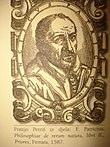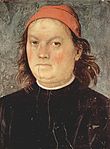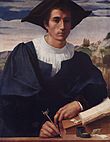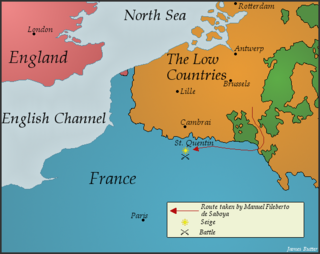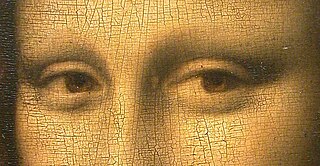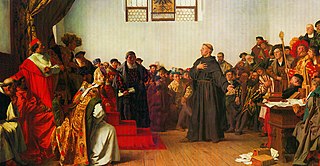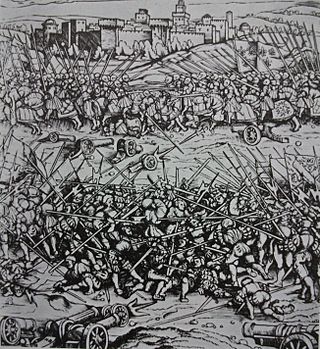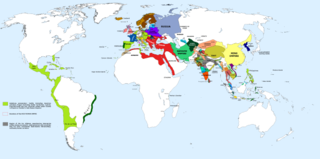Events
1520
January–June
- January 19 – King Christian II of Denmark and Norway defeats the Swedes, at Lake Åsunden in Sweden. The Swedish regent Sten Sture the Younger is mortally wounded in the battle. He is rushed towards Stockholm, in order to lead the fight against the Danes from there, but dies from his wounds on February 3. [1]
- April 16 – Revolt of the Comuneros: Citizens of Toledo, Castile opposed to the rule of the Flemish-born Charles V, Holy Roman Emperor, rise up when the royal government attempts to unseat radical city councilors. [2]
- June – Moctezuma II, Aztec ruler of Tenochtitlan, is declared deposed due to his captivity by conquistador Hernán Cortés. His brother Cuitláhuac rises to the throne.
- June 7 – King Henry VIII of England and King Francis I of France meet at the famous Field of the Cloth of Gold. [3]
- June 10 – Revolt of the Comuneros: Segovia is blockaded.
- June 15 – Pope Leo X issues the bull Exsurge Domine (Arise O Lord), threatening Martin Luther with excommunication, if he does not recant his position on indulgences and other Catholic doctrines. [4]
July–December
- July 1 – La Noche Triste (Night of Sorrow): The forces of Cuitláhuac, Aztec ruler of Tenochtitlan, gain a major victory against the forces of conquistador Hernán Cortés. This results in the death of about 400 conquistadors, and some 2,000 of their Native American allies. However, Cortés and the most skilled of his men manage to escape and later regroup.
- July 7 – Otumba near Lake Texcaco: The Spaniards defeat the Aztecs. [5]
- August – Martin Luther publishes To the Christian Nobility of the German Nation . [6]
- September 7 – Christian II makes his triumphant entry into Stockholm, which had surrendered to him a few days earlier. [7] Sten Sture's widow Christina Gyllenstierna, who has led the fight after Sten's death, and all other persons in the resistance against the Danes, are granted amnesty and are pardoned for their involvement in the resistance.
- September 22 – Suleiman I succeeds his father Selim I as Sultan of the Ottoman Empire. [8] He is officially crowned on September 30. [9]
- October – Cuitláhuac, Aztec ruler of Tenochtitlan, dies from smallpox during an epidemic. [10] He is succeeded by his nephew Cuauhtémoc.
- October 21 (Feast of St. Ursula) – The islands of Saint Pierre and Miquelon are discovered by Portuguese explorer João Álvares Fagundes, off Newfoundland. He names them Islands of the 11,000 Virgins, in honour of Saint Ursula.
- October 23 – Charles V is crowned King of Germany in Aachen. [11]
- November 1 – 4 – Christian II is crowned king of Sweden in Nikolai Church. [12] The coronation is followed by a three-day feast in Stockholm.
- November 7 – At the end of the third day of Christian's coronation feast, several leading figures of the Swedish resistance against the Danish invasion are imprisoned, and tried for high treason. [13]
- November 8 – 9 – Stockholm Bloodbath: 82 noblemen and clergymen, having been sentenced to death for their involvement in the Swedish resistance against the Danish invasion, are executed by beheading. [14]
- November 28 – After navigating through the South American strait, three ships under the command of Portuguese explorer Ferdinand Magellan reach the Pacific Ocean, [15] [16] becoming the first Europeans to sail from the Atlantic Ocean to the Pacific (the strait is later named the Strait of Magellan).
- December 10 – Martin Luther burns a copy of The Book of Canon Law (see Canon Law), and his copy of the Papal bull Exsurge Domine . [17]
Date unknown
- The Franciscan friar Matteo Bassi is inspired to return to the primitive life of solitude and penance, as practiced by St. Francis, giving rise to the Order of Friars Minor Capuchin.
- Duarte Barbosa returns to Cananor.
- Aleksandra Lisowska (Roxelana) is given as a gift to Suleiman I on the occasion of his accession to the throne. [18]
- King Manuel I creates the public mail service of Portugal, the Correio Público. [19]
1521

January–June
- January 3 – Pope Leo X excommunicates Martin Luther, in the papal bull Decet Romanum Pontificem . [20]
- January 22 – Charles V, Holy Roman Emperor, opens the Diet of Worms in Worms, Germany. [21]
- January 27 – Suleiman the Magnificent suppresses a revolt by the ruler of Damascus, Janbirdi al-Ghazali. [22]
- February 2 – The Nydala Abbey Bloodbath takes place at Nydala Abbey, Sweden; the abbot and many monks are murdered by Danes. [23]
- March 6
- Ferdinand Magellan makes the first European contact with Guam, [24] most likely landing in Tumon. [25]
- Martin Luther is summoned to appear before the Diet of Worms. [26]
- March 16 – Ferdinand Magellan reaches the Philippines, in eastern Samar. [27]
- March 31 – The First Mass in the Philippines is held. [28]
- April or May – The Battle of Tunmen occurs, in Tuen Mun (present-day Hong Kong), where the Ming dynasty navy defeats the Portuguese navy. [29] Arguably the first Sino-European battle in world history.
- April 7
- Ferdinand Magellan arrives at Cebu. [30]
- Martin Luther preaches an inflammatory sermon to students at Erfurt, while on his way to Worms. [31]
- April 16 – 18 – Martin Luther is examined before Emperor Charles V and the Diet of Worms, where he refuses to recant his writings and allegedly proclaims, "Here I stand", regarding his belief in the Bible alone, as the standard of Christian doctrine.
- April 23 – Revolt of the Comuneros – Battle of Villalar: Castilian royalists defeat the rebels. [32] Juan López de Padilla, Francisco Maldonado, and Juan Bravo are executed the following day as the leaders of the rebels.
- April 26 – Martin Luther leaves Worms and disappears for around a year [33] – he is rumored to be murdered, but is actually in hiding at the Wartburg castle. [34]
- April 27 – Battle of Mactan: Ferdinand Magellan is killed in the Philippines. [35]
- May – The Italian War of 1521–1526 breaks out between Charles V, Holy Roman Emperor, and Francis I of France.
- May 17 – Edward Stafford, 3rd Duke of Buckingham, is executed for treason in Tower Hill. [36]
- May 20 – Battle of Pampeluna: Allied French-Navarrese forces defeat the Spanish. [37]
- May 25 – The Diet of Worms ends when Charles V, Holy Roman Emperor issues the Edict of Worms, declaring Martin Luther an outlaw and banning his literature. [38]
- May 27 – Jiajing Emperor ascends the throne of the Ming dynasty. [39]
- June 25 – Suleiman the Magnificent begins the siege of Belgrade.
- June 29 or 30 – The oldest surviving dateable document written primarily in the Romanian language: Neacșu's letter, written by a trader from Câmpulung, to Johannes Benkner, the mayor of Brașov, warning that the Ottoman Empire is preparing its troops to cross into Wallachia and Transylvania; the script used is Romanian Cyrillic.
- June 30 – Battle of Esquiroz: French forces under André de Foix, fighting for the exiled King of Navarre Henri d'Albret, are defeated by the Spanish, and forced to abandon their attempt to recover Henri's kingdom. [40]
July–December
- July –Pfaffensturm: Students rebel against priests in Erfurt.
- July 15 — San Juan Bautista is founded as the new capital of the archipelago of Puerto Rico.
- August 13 – Fall of Tenochtitlan: Cuauhtémoc surrenders to Cortés, [41] thus incorporating the Aztec Empire into the Spanish Empire and ending the Late Postclassic period in Mesoamerica.
- August 29 – Belgrade is captured by the Ottoman army of Suleiman the Magnificent. [42] [43]
- October 25 – Revolt of the Comuneros is crushed.
- November 23 – Spanish–German–Papal forces under Prospero Colonna force French Marshal Odet de Lautrec to abandon Milan.
- December 27 – The Zwickau prophets arrive in Wittenberg, disturbing the peace and spreading the idea of rejecting infant baptism. [44]
Date unknown
- Jacopo Berengario da Carpi publishes Commentaria cum amplissimus additionibus super anatomiam Mundini in Bologna, including observation of the vermiform appendix. [45]
- The Grand Duchy of Ryazan is annexed by the Grand Duchy of Moscow. [46]
1522
January–June
- January 9 – Pope Adrian VI (born Adriaan Florenszoon Boeyens, Dedens or Dedel; [47] Hadrianus in Latin) succeeds Pope Leo X, as the 218th pope. The only Dutch pope, he will be the last non-Italian elected for more than 450 years.
- January 26 – Spanish conquistador Gil González Dávila sets out from the gulf of Panama to explore the Pacific coast of Central America. He explores Nicaragua and names Costa Rica when he finds copious quantities of gold in Pacific beaches.
- April 27 – Battle of Bicocca: French and Swiss forces under Odet de Lautrec are defeated by the Spanish in their attempt to retake Milan, and are forced to withdraw into Venetian territory. [48]
- May – England presents an ultimatum to France and Scotland. [49]
- June 19 – Charles V, Holy Roman Emperor visits King Henry VIII of England, and signs the Treaty of Windsor, pledging a joint invasion of France, bringing England into the Italian War of 1521–1526. [50]
July–December
- July – The English army attacks Brittany and Picardy from Calais, burning and looting the countryside. [51]
- July 28 – Ottoman Sultan Suleiman I begins his siege to expel the Knights of St. John in Rhodes.
- August – The Knights' Revolt erupts in Germany.
- September 6 – The Victoria (nao Vittoria), one of the surviving ships of the Magellan expedition, returns to Sanlúcar de Barrameda in Spain, under the command of Juan Sebastián Elcano, becoming the first ship to circumnavigate the world.
- September 21 – Luther Bible: Martin Luther's translation of the Bible's New Testament into Early New High German from Greek, Das newe Testament Deutzsch, is published in Germany, selling thousands in the first few weeks.
- September 22 – 1522 Almería earthquake: A major 6.8 to 7.0 Mw earthquake occurs in the capital of Almeria and the Andarax Valley, near Alhama de Almería. It has a maximum felt intensity of X–XI (extreme), and kills about 2,500 people, making it the most destructive earthquake in Spanish history. The city of Almería is totally destroyed, and there is serious destruction in 80 other towns; in Granada, large cracks are observed in various walls and towers. [52]
- October 21–22 – The 1522 Vila Franca earthquake takes place in the municipality of Vila Franca do Campo, at this time the provincial capital, located on São Miguel Island, in the Portuguese archipelago of the Azores.
- November – The Diet of Nuremberg opens.
- December 18 – The Ottomans finally break into Rhodes, but the Knights continue fierce resistance in the streets.
- December 20 – Suleiman the Magnificent accepts the surrender of the surviving Knights in Rhodes, who are allowed to evacuate. They eventually re-settle on Malta, and become known as the Knights of Malta.
Date unknown
- The third edition of Erasmus's Greek Textus Receptus of the New Testament, Novum Testamentum (with parallel Latin text), is published in Basel.
- Chinese Ming dynasty War Ministry official He Ru is the first to acquire the Portuguese breech-loading culverin, while copies of them are made by two Westernized Chinese at Beijing, Yang San (Pedro Yang) and Dai Ming.
- Australia is sighted by a Portuguese expedition led by Cristóvão de Mendonça, who maps the continent and names it Jave la Grande ("The Greater Java"), according to the theory of the Portuguese discovery of Australia.
- The Portuguese ally with the Sultanate of Ternate and begin the construction of Fort Kastela.
- The Portuguese, allied with King Ilato of the Goratalo kingdom, construct the Otanaha Fortress.
1523
January–March
- January 20 – Christian II is forced to abdicate as King of Denmark and Norway after the nobles of the herredag at Viborg have renounced their allegiance in favor of his uncle, Frederick, Duke of Holstein. Christian is exiled to the Netherlands in April. [53]
- February 15 – Construction of Fort Kastela by Portuguese invaders, on what is now the island of Ternate in Indonesia, is completed as Portugal claims the Spice Islands (now the Maluku Islands). [54]
- February 25 – On the Arabian Peninsula, in what is now Yemen, troops from Portugal fight the Battle of al-Shihr against the Kathiri Sultanate, ruled by the Emir Mutran bin Mansur. After a battle of one day, the Portuguese sack the capital, Al-Shihr, and establish a port on the Indian Ocean.
- February 27 – Captain Antón Mayor formally claims for Spain what is now Nicaragua, after he arrives with Andrés Niño and other Spanish troops on the Central American coast at El Realejo. [55]
- March 8 – In Spain's Kingdom of Valencia, a rebellion by the Brotherhoods of Mallorca is suppressed after two years, as the rebels surrender their capital, Palma de Mallorca, to Spanish and German troops. [56]
- March 26 – Frederick I is provisionally declared as King of Denmark by Danish nobles at Viborg, although loyalists at Copenhagen refuse to recognize his claim to the throne. Christian II, 1481-1559, regent 1513-1523. [57]
April–June
- April 4 – Under a plan organized by Sister Katharina von Bora and Protestant reformer Martin Luther, fish merchant Leonhard Köppe helps carry out the rescue of Von Bora and other Cistercian Catholic nuns from the Nimbschen Abbey in Germany near Grimma and Leipzig. On the day before Easter, Köppe arrives at the convent under the pretext of bringing delivering herring and other foods to the Abbey, then uses empty barrels to smuggle the nuns to Wittenberg. Von Bora will later become Luther's wife. [58] [59]
- April 12 – The Spanish conquest of Nicaragua continues as Gil González Dávila and 17 other soldiers arrive at Lake Nicaragua and claim it for the Spanish crown, calling the freshwater source the Mar Dulce. Gonzalez and 100 men with him have been welcomed by Macuilmiquiztli Nicarao, leader of the friendly Nicarao people, to explore the area. [60]
- April 14 – Mirza Shah Hossein, Grand Vizier of Persia since 1514, is assassinated in Qazvin (now in Iran) by Shia nobles of the Qizilbash sect, and replaced by Jalal al-Din Mohammad Tabrizi. [61]
- April 15 – Sir Thomas More, noted for being a Catholic social philosopher and author of the 1516 novel Utopia , is appointed by King Henry VIII as the Speaker of the English House of Commons for the first parliamentary session since 1515. He serves until the Parliament adjourns on August 15.
- April 17 – In Nicaragua, Diriangén, ruler of the Chorotega speakers, stages an attack on the Spanish invaders led by González Dávila. [60] Having been warned by one of the Nicarao natives of the intended surprise attack, Spanish defenders on horses rout the Chorotega, but several of the Spaniards are wounded. The Spanish then decide to proceed no further inland.
- April 23 – Charles V, Holy Roman Emperor, brings the Spanish Inquisition to the Netherlands with the appointment of Frans Van der Hulst as the inquisitor general of the Seventeen Provinces, which will later become parts of the Belgium, France, Luxembourg and the southern Netherlands. [62]
- April 24 – The Diet of Hungary, parliament for the Kingdom of Hungary under King Lajos II, passes a decree ordering the confiscation of property and execution of all followers of Martin Luther within the Kingdom. [63]
- May 6 – In the Electoral Palatinate in Germany, the Knights' Revolt, led by Franz von Sickingen since August 27, is finally put down at Landstuhl by troops of the Holy Roman Empire as the Nanstein Castle falls. [64] Sickingen, mortally wounded in the final battle, dies of his wounds the next day.
- May 5 – An assassination attempt is made against King Sigismund of Poland, who is shot at while walking outside his residence at Wawel Castle overlooking Kraków. [65]
- May 20 – Andrea Gritti is elected as the new Doge of the Republic of Venice, 13 days after the death of Antonio Grimani. [66]
- May 27 – Swedish War of Liberation: The city of Kalmar in Sweden, occupied by troops of Denmark, falls to a Swedish Army force led by Arvid Västgöte after the city's magistrates agree to leave the northern gate of the city open. [67] Kalmar Castle surrenders on June 4. With the fall of Kalmar, only Stockholm remains as a site of the Danish occupation.
- May 31 – Following the Battle of Sincouwaan at sea between the ships of the Chinese Empire and the Kingdom of Portugal, the Malay ambassador to China reluctantly departs from Guangzhou to present letters to the Portuguese governors of the occupied Malacca Sultanate, demanding the restoration of the deposed Sultan. Though fearing execution by the Portuguese, the messengers are allowed to leave. They return in September with a plea for help from the Malay Sultan, whose territory is under attack from the Europeans. [68]
- May – The Ningbo Incident: Two rival trade delegations from Japan feud in the Chinese city of Ningbo, resulting in the pillage and plunder of the city. [69]
- June 3 – Santhome Church is established by Portuguese explorers over the tomb of Saint Thomas the Apostle at Madras (now Chennai) in India.
- June 6 – Gustav Vasa is elected king of Sweden, finally establishing the full independence of Sweden from Denmark, which marks the end of the Kalmar Union. This event is also traditionally considered to be the establishment of the modern Swedish nation. [70]
- June 10 – Frederick begins the 8-day siege of Copenhagen, the capital of Denmark. The city surrenders on 6 January 1524. [57]
- June 12 – July 19 – Franconian War: The Swabian League destroys 23 robber baron castles. [71] [72]
- June 17 – Swedish War of Liberation: The surrender of Stockholm by Denmark is accepted by Sweden's King Gustav Vasa. [67] In return, the city's defenders are allowed safe passage out of Sweden. King Gustav then makes his triumphant entry to the city on June 24.
- June 23 – The Spanish expedition into Nicaragua ends as the Europeans arrive back in Panama in canoes, having been forced to abandon their ships. [60]
- June 27 – Pargali Ibrahim Pasha is appointed as the Grand Viziers of the Ottoman Empire by the Ottoman Sultan, Suleiman the Magnificent. [73] Ibrahim Pasha will serve as the Ottoman administrator for almost 13 years until his sudden arrest and execution in 1536.
July–September
- July 1 – Jan van Essen and Hendrik Vos become the first Lutheran martyrs, burned at the stake in Brussels at the Grote Markt. [74] In response to the executions, Martin Luther composed a hymn called "A New Song Be By Us Begun".
- July 7 – Wijerd Jelckama, a Frisian warlord and military commander, is executed in Leeuwarden, ending the Frisian rebellion fought by the Arumer Black Heap.
- July 25 – In what is now Mexico, the conquistador Gonzalo de Sandoval founds the city of Colima. [75]
- July 29 – The Republic of Venice and the Holy Roman Empire conclude the Treaty of Worms to remove Venice from the Italian War that has gone for two years. [76]
- c. July – Martin Luther's translation of the Pentateuch into German (Das allte Testament Deutsch) is published by Melchior Lotter Jr. in Wittenberg. [77]
- August 22 – Lucien Grimaldi, Lord of Monaco, is assassinated by his nephew at the Prince's Palace. [78] Bartolomeo Doria di Dolceaqua, the son of Lucien's sister Francesca, kills his uncle and then has his men drag the monarch's body down the palace stairs in front of a horrified crowd, who drive the Doria family out of the small principality. Lucien had become the ruler in 1505 after stabbing to death his brother, Jean II. Lucien's heir is his 8-month-old son, Honoré; Lucien's brother Augustine Grimaldi becomes the regent during Honoré's minority.
- September 14 – Pope Adrian VI, the last Dutch person to serve as head of the Roman Catholic Church, dies at age 64 after a reign of 21 months. For the next 455 years, all Popes elected will be Italian cardinals until the election of Karol Wojtyla of Poland in 1978 as Pope John Paul II.
- September 22 – Spanish conquest of Nicaragua: An agreement is made for an expedition by conquistadores into Nicaragua organized by Pedrarias Dávila. [79]
- September 23 – After receiving word from Malaya that Portuguese forces were attacking the Sultanate of Patani and the Malacca Sultanate on the Malaysian peninsula, the China's Emperor Zhengde orders extermination of all persons from Portugal, 23 envoys from Portugal are executed and mutilated. [68]
October–December
- October 1 – A conclave of 32 cardinals begins deliberations in Rome to elect a successor to the late Pope Adrian VI. Three other cardinals arrive on October 6 and balloting begins for a new Pope. Niccolò Fieschi and Bernardino López de Carvajal y Sande fail to receive the necessary majority in initial balloting, and Gianmaria del Monte comes within one vote (26 votes) of being elected. Voting continues for seven weeks before Cardinal Giulio de Medici wins 27 votes. [80]
- October 27 – Hürrem Pasha, the Ottoman Empire's Governor-General of the Damascus Eyalet (which includes parts of what will become Syria, Israel, Jordan and Palestine) begins a punitive expedition through Lebanon against the Druze of Chouf. During the first campaign, Hürrem's troops burn 43 villages and kill at least 400 Druze. [81]
- November 19 – Following the September 14 death of Pope Adrian VI, Cardinal Giulio de' Medici is elected 219th pope as Clement VII. [82] The election of Cardinal Medici begins an unbroken reign of 44 consecutive Italian Popes over the next 455 years.
- November 26 – At Santa Maria in Via Lata, Cardinal Marco Cornaro carries out the coronation of Pope Clement at the church of Santa Maria in Via Lata in Rome.
- December 6 – Setting off from the Mexican Aztec capital of Tenochtitlan with an army of 550 Spanish soldiers and 120 horses, Pedro de Alvarado y Contreras begins the Spanish conquest of Guatemala. [83]
Date unknown
- The Ming dynasty Chinese navy captures two Western ships with Portuguese breech–loading culverins aboard, which the Chinese call a fo–lang–ji (Frankish culverin). According to the Ming Shi, these cannons are soon presented to the Jiajing Emperor by Wang Hong, and their design is copied in 1529. [84]
- In northern Italy, a French army under Guillaume Gouffier tries to recover Milan but fails due to an offensive by Spanish, Imperial and English troops and they retreat in mid-November. [85]
1524
January–June
- January 17 – Florentine explorer Giovanni da Verrazzano, on board La Dauphine in the service of Francis I of France, sets out from Madeira for the New World, to seek out a western sea route to the Pacific Ocean.
- March – Spanish conquistador Pedro de Alvarado destroys the Kʼicheʼ kingdom of Qʼumarkaj, taking the capital, Quiché.
- March 1 (approximate date)– da Verrazzano's expedition makes landfall at Cape Fear.
- April 17 – Verrazzano's expedition makes the first European entry into New York Bay, and sights the island of Manhattan. [86] [87]
- April 30 – Battle of the Sesia: Spanish forces under Charles de Lannoy defeat the French army in Italy, under William de Bonnivet. The French, now commanded by François de St. Pol, withdraw from the Italian Peninsula.
- May 26 – Atiquipaque, the most important city of the Xinca people is conquered by the Spanish resulting in a significant reduction in the Xinca population.
- June 8 – Battle of Acajutla: Spanish conquistador Pedro de Alvarado defeats a battalion of Pipiles, in the neighborhoods of present day Acajutla, El Salvador. [88]
July–December
- July 8 – Verrazzano's expedition returns to Dieppe.
- August–September – Marseille is besieged by Imperial forces, under the Duke of Bourbon.
- August – Protestant theologians Martin Luther and Andreas Karlstadt dispute at Jena.
- October 28 – A French army invading Italy, under King Francis, besieges Pavia.
- December 8 – Francisco Hernandez de Cordoba founds the city of Granada, Nicaragua, the oldest Hispanic city in the mainland of the Western Hemisphere.
1525
January–June
- January 21 – The Anabaptist Movement is born [89] when Conrad Grebel, Felix Manz, George Blaurock, and about a dozen others baptize each other in the home of Manz's mother on Neustadt-Gasse, Zürich, [90] breaking a thousand-year tradition of church-state union.
- February 24 – Battle of Pavia: German and Spanish forces under Charles de Lannoy and the Marquis of Pescara defeat the French army, and capture Francis I of France, after his horse is wounded by Cesare Hercolani. While Francis is imprisoned in Lombardy and then transferred to Madrid, the first attempts to form a Franco-Ottoman alliance with Suleiman the Magnificent against the Habsburg Empire are made. [91]
- February 28 – The last Aztec Emperor, Cuauhtémoc, is killed by Hernán Cortés. [92]
- March 20 – In the German town of Memmingen, the pamphlet The Twelve Articles: The Just and Fundamental Articles of All the Peasantry and Tenants of Spiritual and Temporal Powers by Whom They Think Themselves Oppressed is published, [93] the first human rights related document written in Europe.
- April 4 – German Peasants' War in the Holy Roman Empire: Battle of Leipheim – The peasants suffer great losses when they are attacked by Georg, Truchsess von Waldburg and the town of Leipheim is forced to surrender. [94] Four peasant leaders are beheaded, including Jakob Wehe and Ulrich Schoen.
- April 10 – Albert, Duke of Prussia commits Prussian Homage.
- May 14 – 15 – German Peasants' War: Battle of Frankenhausen – Insurgent peasants led by radical pastor Thomas Müntzer are defeated. [95] Following the defeat, Müntzer is executed in front of the gates of Mühlhausen. [96]
- June 13 – Martin Luther marries ex-nun Katharina von Bora. [97] The painter Lucas Cranach the Elder is one of the witnesses. [98]
- June 18 – Henry VIII of England appoints his six-year old illegitimate son Henry FitzRoy Duke of Richmond and Somerset. [99] [100]
- June 23 – 24 – German Peasants' War: Battle of Pfeddersheim – Peasants are defeated in the last significant action of the war, in which over 75,000 peasants have been killed.
July–December
- July 29 – Santa Marta, the first city in Colombia, is founded by Spanish conquistador Rodrigo de Bastidas. [101]
- November 25 – Charles V, Holy Roman Emperor acting in his capacity as the King of Spain, issues an edict ordering the expulsion or conversion of the remaining Muslims in the Crown of Aragon, similar to that issued for the Crown of Castile by Queen Isabella in 1502. The order applies to the Kingdom of Valencia and the Principality of Catalonia. [102]
- December 8 – A second edict is issued in Spain directing Spanish Muslims to show proof of baptism as Christians or to leave by the deadline of December 31 (for Valencia) or January 26 (for Aragon and Catalonia). [102]
- December 31 – The deadline for Spanish Muslims to convert to Christianity in the Valencia is reached, after which remaining Muslims, or those who harbor them as fugitives, becomes punishable by forced exile, imprisonment or death. [102]
- December – The first French ambassador to reach the Sublime Porte, Jean Frangipani, sets out for Constantinople.
Date unknown
- Mixco Viejo, capital of the Pocomans Maya State, falls to the Spanish conquistadores of Pedro de Alvarado (in modern-day Guatemala) after a three-month siege. [103]
- European-brought diseases sweep through the Andes, killing thousands, including the Inca.
- The Bubonic plague spreads in southern France.
- Printing of the first edition of William Tyndale's New Testament Bible translation into English in Cologne is interrupted by anti-Lutheran forces and Tyndale flees to Worms [104] (finished copies reach England in 1526). [105] [106]
- Printing of Huldrych Zwingli's New Testament 'Zürich Bible' translation into German by Christoph Froschauer begins.
- The Navarre witch trials (1525-26) begins. [107]
- The Chinese Ministry of War under the Ming dynasty orders ships having more than one mast sailing along the southeast coast to be seized, investigated, and destroyed; this in an effort to curb piracy and limit private commercial trade abroad.
- Kasur established as a city by the Kheshgi tribe of Pashtuns from Kabul who migrate to the region in 1525 from Afghanistan.
- The Age of Samael ends, and the Age of Gabriel begins, according to Johannes Trithemius. [108]
1526
January–June
- January 14 – Treaty of Madrid: Peace is declared between Francis I of France and Charles V, Holy Roman Emperor. Francis agrees to cede Burgundy and abandons all claims to Flanders, Artois, Naples, and Milan. [109]
- January 26 – The deadline for Spanish Muslims to convert to Christianity or leave is reached in the Crown of Aragon and the Principality of Catalonia as decreed by the edict of November 25 by Charles V, Holy Roman Emperor acting in his capacity as King of Spain. The deadline for the Kingdom of Valencia had passed on December 31, 1525. [110]
- April 21 – Battle of Panipat: Babur becomes Mughal emperor, invades northern India and captures Delhi, creating the Mughal Empire, which lasts until 1857. [111] [112]
- May 22 – Francis repudiates the Treaty of Madrid and forms the League of Cognac against Charles, including Pope Clement VII, Milan, Venice, and Florence. [113]
- May 23 – A transit of Venus occurs, [114] [115] the last before optical filters allow astronomers to observe them.
- June 9 – Emperor Go-Nara ascends to the throne of Japan.
July–December
- July – The Spanish ship Santiago, from García Jofre de Loaísa's expedition, reaches the Pacific Coast of Mexico, the first to navigate from Europe to the west coast of North America. [116]
- July 24 – Milan is captured by the Spanish. [117]
- August 15 – The first official translation is made of the New Testament into Swedish; the entire Bible is completed in 1541. [118]
- August 21 – Spanish explorer Alonso de Salazar becomes the first European to sight the Marshall Islands, in the Pacific Ocean. [119]
- August 29 – Battle of Mohács: The Ottoman army of Sultan Suleiman I defeats the Hungarian army of King Louis II, who is killed in the retreat by drowning. [120] Suleiman takes Buda, while Archduke Ferdinand of Austria and John Zápolya, Prince of Transylvania, dispute the succession. [121] As a result of the battle, Dubrovnik achieves independence, although it acknowledges Turkish overlordship.
- September 19 – Spanish Muslims who had hidden in the Sierra de Espadán mountain range in Valencia and who are led by Selim Almanzo are overwhelmed by a German contingent of 3,000 soldiers from the Holy Roman Empire. After their defeat, 5,000 adult Muslims (including old men and women) are massacred. [122]
Date unknown
- Spring – The first complete printed translation of the New Testament of the Bible into the English language by William Tyndale arrives in England from Germany, printing having been completed in Worms by Peter Schöffer the younger (with other copies being printed in Amsterdam). In October, Cuthbert Tunstall, Bishop of London, attempts to collect all the copies in his diocese and burn them.
- Gunsmith Bartolomeo Beretta (in Italian) establishes the Beretta Gun Company, which will still be in business in the 21st century, making it one of the world's oldest firearm corporations. [123] [124]
1527
January–June
- January 1 – Croatian nobles elect Ferdinand I of Austria as King of Croatia in the Parliament on Cetin.
- January 5 – Felix Manz, co-founder of the Swiss Anabaptists, is drowned in the Limmat in Zürich by the Zürich Reformed state church.
- March 17 – Battle of Khanwa: Babur defeats Rajput ruler Rana Sanga. This and two other major Moghul victories lead to their domination of northern India. Dhaulpur fort is taken by Babur. [125]
- March – The Confederation of Shan States sack Ava, the capital of the Ava Kingdom.
- April 30 – The Treaty of Westminster (1527), an alliance during the War of the League of Cognac, is signed.
- May 6 – Sack of Rome: Spanish and German troops led by the Duke of Bourbon sack Rome, forcing Pope Clement VII to make peace with Charles V, Holy Roman Emperor, marking the end of the High Renaissance. The Pope grows a beard in mourning.
- May 16 – In Florence, the Piagnon, a group devoted to the memory of Girolamo Savonarola, drive out the Medici for a second time, re-establishing the Republic of Florence until 1530.
- June 17
- The Narváez expedition to conquer Florida sets sail from Spain.
- The Protestant Reformation begins in Sweden. The Riksdag of the Estates in Västerås adopts Lutheranism as the state religion, in place of Roman Catholicism. This results in the confiscation of church property and dissolution of Catholic convents in accordance with the Reduction of Gustav I of Sweden.
- June 22 – Jakarta, current capital of Indonesia, is founded as Jayakarta. [126]
July–December
- August 3 – The first known letter is sent from North America by John Rut, while at St. John's, Newfoundland.
- August 20
- Sixty Anabaptists meet at the Martyrs' Synod in Augsburg.
- Diet of Odense (Denmark): King Frederick I declares religious tolerance for Lutherans, permits marriage of priests and forbids seeking papal pallium (approval) for royal appointments of Church officials. [127] [128]
- September 27 – Battle of Tarcal: Ferdinand, future Holy Roman Emperor, defeats John Zápolya and takes over most of Hungary. John appeals to the Ottomans for help.
Date unknown
- The Spanish conquest of Guatemala's highlands is completed; the first city in Guatemala, Ciudad Vieja is founded.
- Members of the University of Wittenberg flee to Jena, in fear of the bubonic plague.
- Bishop Vesey's Grammar School (at Sutton Coldfield, in the West Midlands of England) is founded by Bishop John Vesey.
- Sir George Monoux College is founded as a grammar school at Walthamstow, England, by Sir George Monoux, draper and Lord Mayor of London.
- The Ming dynasty government of China greatly reduces the quotas for taking grain, severely diminishing the state's capacity to relieve famines through a previously successful granary system.
- The second of the Dalecarlian rebellions breaks out in Sweden.
1528
January–June
- January 12 – Gustav I of Sweden is crowned king of Sweden, having already reigned since his election in June 1523. [129]
- February
- Peasant uprising in Dalarna, Sweden: The rebel campaign fails, and the rebel leader, later known as Daljunkern , flees to Rostock.
- Diego García de Moguer explores the Sierra de la Plata along the Río de la Plata, and begins to travel up the Paraná River. [130]
- April 28 – Battle of Capo d'Orso: The French fleet, under mercenary captain Filippino Doria, crushes the Spanish squadron trying to run the blockade of Naples. [131]
- May (end) – The fourth major outbreak of the sweating sickness appears in London, rapidly spreading to the rest of England and, on this occasion, to northern Europe.
July–December
- September 12 – Andrea Doria defeats his former allies, the French, and establishes the independence of Genoa.
- October 3 – Álvaro de Saavedra Cerón arrives in the Maluku Islands.
- October 13 – Cardinal Thomas Wolsey founds a college in his birthplace of Ipswich, England, which becomes the modern-day Ipswich School (incorporating institutions in the town dating back to 1299).
- October 20 – The Treaty of Gorinchem is signed between Charles V, Holy Roman Emperor, and Charles, Duke of Guelders.
- November 6 – Spanish conquistador Álvar Núñez Cabeza de Vaca and his companions become the first known Europeans to set foot on the shores of what is present-day Texas.
Date unknown
- Montenegro gains autonomy under Ottoman power.
- Spanish Conquistador Francisco de Montejo attempts an invasion of the Yucatán, but is driven out by the Maya peoples.
- Spain takes direct control of Acapulco.
- Bubonic plague breaks out in England. [132]
- St George's Chapel in Windsor Castle is completed.
- Chateau Fontainebleau in France is begun.
- Michelangelo Buonarroti begins work on the fortifications of Florence.
- Baldassare Castiglione publishes The Book of the Courtier .
- In Henan province, China, during the mid Ming dynasty, a vast drought deprives the region of harvests for the next two years, killing off half the people in some communities, due to starvation and cannibalism. [133]
- Perak Sultanate and Johor Sultanate were established, both states being ruled by the sons of Mahmud Shah of Malacca.
1529
January–June
- February 2 – The Örebro Synod provides the theological foundation of the Swedish Reformation, following the economic foundation of it, after the Reduction of Gustav I of Sweden.
- March – Battle of Shimbra Kure: Imam Ahmad ibn Ibrahim al-Ghazi, with 200 men armed with matchlocks, defeats the army of Dawit II, Emperor of Ethiopia. [134]
- March 25 – Blood libel against the Jewish community of Bosen (formerly in Hungary, today in Slovakia), on the first day of Passover. Three Jews are accused and killed, while the boy is discovered alive, kidnapped for the benefit of the scheme.
- April 8 – The Flensburg Disputation is held, a debate attended by Stadtholder Christian of Schleswig-Holstein (later King Christian III of Denmark), between Lutherans (led by Hermann Fast) and the more radical Anabaptists (led by Melchior Hoffman). Johannes Bugenhagen, a close associate of Martin Luther, presides. The Disputation marks the rejection of radical ideas by the Danish Reformation. [135]
- April 9 – The Westrogothian rebellion breaks out in Sweden.
- April 19 – Diet of Speyer: A group of rulers (German: Fürst) and independent cities (German: Reichsstadt) protest the reinstatement of the Edict of Worms, beginning the Protestant movement.
- April 22 – The Treaty of Zaragoza divides the eastern hemisphere between the Spanish and Portuguese empires, stipulating that the dividing line should lie 297.5 leagues or 17° east of the Moluccas. [136]
- May – July – Cardinal Thomas Wolsey, Archbishop of York, presides over a legatine court at Blackfriars, London, to rule on the legality of King Henry VIII of England's marriage to Catherine of Aragon. [49]
- May 10 – The Ottoman army under Suleiman I leaves Constantinople, to invade Hungary once again.
- June 21 – War of the League of Cognac – Battle of Landriano: French forces in northern Italy are decisively defeated by Spain.
July–December
- July 30 – The only continental outbreak of English sweating sickness reaches Lübeck, spreading from there into Schleswig-Holstein in the next few months. [137]
- August 5 – Charles V, Holy Roman Emperor, and Francis I of France sign the Treaty of Cambrai, or Ladies' Peace in the War of the League of Cognac: Francis abandons his claims in Italy, but is allowed to retain the Duchy of Burgundy. Henry VIII of England accedes on August 27. [50]
- September 1 – Sancti Spiritu, the first European settlement in Argentina, is destroyed by local natives.
- September 8
- Buda is recaptured by the invading forces of the Ottoman Empire.
- The city of Maracaibo, Venezuela is founded by Ambrosius Ehinger.
- September 27 – Siege of Vienna: Vienna is besieged by the Ottoman forces of Suleiman the Magnificent. [138]
- October 15 – With the season growing late, Suleiman abandons the Siege of Vienna (a turning point in the Ottoman wars in Europe).
- October 26 – Cardinal Wolsey falls from power in England, due to his failure to prevent Habsburg expansion in Europe, and obtain an annulment of Henry VIII's marriage. Thomas More succeeds him as Lord Chancellor. [50]
- November 4 – December 17 – The English Reformation Parliament is first seated. [50]
Date unknown
- Aylesbury is granted the county town of Buckinghamshire, England by King Henry VIII.
- Stephen Báthory becomes governor of Transylvania.
- Borommarachathirat IV succeeds Ramathibodi II as king of Ayutthaya.
- Fluorite is first described, by Georg Agricola.
- Giorgio Vasari visits Rome.
- Pietro Bembo becomes historiographer of Venice.
- Heinrich Bullinger becomes pastor of Bremgarten, Switzerland.
- German polymath Heinrich Cornelius Agrippa publishes Declamatio de nobilitate et praecellentia foeminei sexus ("Declamation on the Nobility and Preeminence of the Female Sex"), a book pronouncing the theological and moral superiority of women.
- A summit level canal between Alster and the Trave in Germany opens to navigation. [139]












